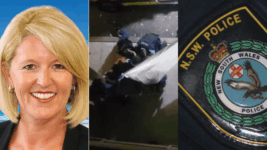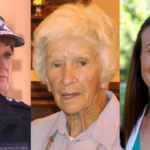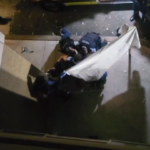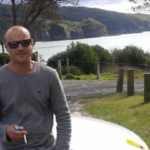Despite Calls for Reform, NSW Police Officers Are Still Killing Mentally Ill People in Crisis

The NSW Police Force conducted a review of the practice of sending its officers in to deal with people having mental health crisis in public, as the problem is it often results in police killing civilians. And the review ultimately recommended in April 2024 that a health-focused alternative be devised, and yet, officers again killed another civilian when conducting a welfare check last week.
Two officers held up a sheet to hide the view as their colleagues swarmed on top of 45-year-old Colin Burling, who appeared to be face down on the ground out the front of his residence on Gadigal land in Sydney’s Waterloo early morning on 15 July. Burling called out that he couldn’t breathe, which didn’t prevent officers from continuing to restrain the dying man until he was dead.
The unnecessary killing of Burling took place also in spite of the June 2024 released final report of the NSW parliamentary upper house inquiry into mental health care access having recommended that “in conjunction with NSW Health, NSW Police explore being activated as a secondary response to mental health emergencies only where required to support the safety of primary responders”.
The Greens-led inquiry further called on NSW police to release its internal report on police continuing to be relied upon as first responders, of which it did. But then, when the Minns government provided its response to the 30-odd recommendations, it said it supports the suggestion to reform first responder arrangements but only “in principle”, which means Labor “sort of agrees”.
So, the fact that Burling’s partner, Taite Collins, was able to film several police officers pressing down upon his partner until he ceased breathing last week, over a year after a parliamentary inquiry and the state law enforcement agency both called for change, raises questions as to whether NSW Labor fully appreciates the issue yet, as it really ought to do something about actioning reform.
A health-led approach
The decision to include the consideration of police as first responders within the NSW parliamentary inquiry into mental health care access in July 2023, came on the back of the May 2023 fatal tasering of 95-year-old Clare Nowland, who was suffering dementia, when officers were called in to deal with her as she’d been seen walking the halls of her nursing home brandishing a steak knife.
Nowland was holding a knife and using the aid of her walking frame to exit a room, of which NSW police constable Kristian White and his partner had entered early morning on 17 May 2023, when, after she’d refused to stop, White uttered, “Nah, bugger it”, and then tasered the elderly woman twice, which caused her to fall to the ground, hit her head and die the following week in hospital.
Following Nowland’s death at the hands of police, there proceeded to be a string of four more police killings of civilians suffering mental health crisis out in the community, which ended with the shooting death of Andrew Pinnock in January 2024. And it is presumably this series of deaths that led state law enforcement to undertake its own internal review.
The upper house inquiry found that “the attendance of police in mental health emergencies can escalate emotional and psychological distress and has been harmful in a significant number of cases”, while it further noted that police representatives themselves support a “health-led approach to mental health emergencies”.
The upper house inquiry further recommended that NSW police improves its mental health training, and that consideration be given to the implementation of the Right Care, Right Person model that was rolled out by the Metropolitan Police in Greater London in November 2023, as it involves an alternative Triple 1 emergency assistance number that avoids police involvement in response.
Reluctant first responders
“In a majority of instances where police are deployed, a criminal offence has not been committed and there is no threat of violence or weapon involved,” states the Summary Internal Review of the NSW Police Force Response to Mental Health Incidents in the Community report.
“While police are best equipped to respond to incidents involving criminality and public order, other health professionals are able to provide more appropriate care for people experiencing mental health crises,” the NSWPF explained in April last year.
The report further outlines that, on average, NSW police is called out to attend a mental health incident every 9 minutes. Over the year 2022, the force recorded 61,164 incidents that it was called out “in relation to people experiencing a mental health emergency” or an “incident where there was not an associated criminal offence”. This is a 41 percent increase on the number of incidents in 2018.
Similar to the NSW parliamentary report, the NSW Police Force review found that sending in police officers to deal with people having mental health episodes increases the risks of adverse outcomes for the civilians involved, as the presence of police is often perceived as a threat or an authoritarian response, so the presence of officers can often play an “escalating factor” at such incidents.
“The high volume of police deployment to mental health related matters can also have flow on impacts to other community safety issues, limiting resources of police to respond to other matters,” the NSW police internal review continues, and it adds that the legislative intention is that police “detect crime and protect life”, rather than attempting to play the role of psychologists.
The NSW police review concludes with the recommendation that state law enforcement and NSW Health consider an alternative, so that NSW police might be considered secondary responders when this is assessed as necessary, and in considering an alternative, the Right Care, Right Person model now operating in the UK should be given particular consideration.
Shirking on the lifesaving alternatives
So, in the wake of last week’s avoidable police killing of a man who was suffering a mental health crisis, it would appear that it is the NSW government’s agreeance that a different model should be considered but only “in principle” that has led the state to be in the exact situation that it was in 12 months ago, in terms of sending in the police as first responders only to see people killed as a result.
The common wisdom is that once NSW police has a power, it will resist losing it. So, in terms of calls for police reform, such as ending of the warrantless use of sniffer dogs in public, they are usually met with reluctance from NSW police. However, in this instance, where officers are empowered to deal with mental health crisis, this is a task that NSW police officers want to relinquish.
“There is consensus that people experiencing mental ill health need appropriate medical care,” said NSW police minister Yasmin Catley in response to the NSW police internal review report being released last September. “This is a complex issue and it’s important we have the right processes and support in place to address mental health incidents within the community.”
“We want to explore an alternate model so police can respond to crime first and foremost, and those experiencing mental ill health can receive the right care,” the minister added.
But the fatality last week that came about as a couple of NSW police officers decided that they’d have a go at dealing with a civilian man in his 40s having a mental health crisis despite having inadequate training or any understand of how to deal with the person without using force, it would appear that Catley is still wanting to explore those alternatives rather than implement any.







